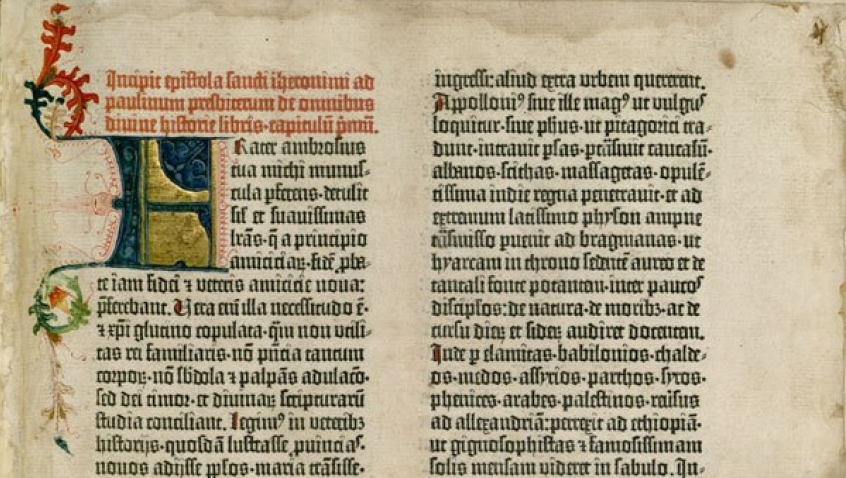
Inerrancy accepted, discarded, established and eroded
Last week on this side of the pond, specifically at John MacArthur's Shepherds' Conference in California, the hot topic has been the inerrancy of Scripture. Inerrancy means that the Bible, in its original manuscripts, is 'without error in all that it affirms'. For the first 16 centuries of church history inerrancy was accepted. People believed that the Bible was written by men, but men who "spoke from God" and were "moved by the Holy Spirit" (2 Peter 1:21). With the Age of Reason in the 17<sup>th and 18<sup>th centuries came Enlightenment thinking which had the effect of raising the thoughts of man above the mind of God.
In this same vein, German Higher Criticism in the early 1800's deconstructed the Scriptures and they were left with a Bible of many errors. This caused a debate as to the nature and authority of Scripture. Some became anti-supernaturalists, denying the miracles: some questioned the historicity of events and even a historical Adam. Darwin's influence had the effect of casting doubt upon the trustworthiness of the book of Genesis and the doctrine of inerrancy began to be discarded by the church.
In response, BB Warfield of Princeton reaffirmed inerrancy in a classic exposition in 1881. The term was hotly debated in the 1970's in what became known as the 'battle for the Bible'. One of the results of that battle was the 1978 document called the Chicago Statement on Inerrancy. The doctrine had once again been publicly established. Yet in recent days, the debate has arisen again with open theism and evolutionary theories raising doubts as to the inerrancy of the Scriptures. A scholarly debate between Peter Enns and Greg Beale resulted in Beale critiquing Enns who said that he isn't questioning, "whether the Bible is inerrant... but how the Bible is inerrant".
This year's Shepherds' Conference highlighted both the erosion of belief in the inerrancy of the Scriptures since 1978, and the importance of the doctrine for the life of the church.
The shift and the slide
The problem is that when you shift from the inerrancy view, you shift on your view of the authority and character of God. "What or who is your authority?" is then a question amongst professing believers? With the shift begins a slide,so that some like Steve Chalke suggest the Bible contains errors and therefore even abhorrent ideas. Chalke denied penal substitution in 2004 calling it "cosmic child abuse" and thus discarded the central motif of the atonement and the true gospel. If you suggest the Bible has errors, you suggest that it cannot be trusted and therefore God cannot be trusted. The authority of God is indirectly challenged. It's a subtle, "Did God actually say?" and "You will not surely die." From the beginning the temptation was to doubt the inerrancy of God's Word. And since the fall the tendency of man is always to bring God down to his level. As God said to Israel in Psalm 51:21, "You thought I was one like you." When that happens we are on the way to apostasy.
The effects of rejecting inerrancy
So the effects of rejecting inerrancy are very serious indeed. Those opposed to it want us to believe that the message of the Bible is inerrant but the details are not. But how can we trust God if the Word he breathes out (2 Timothy 3:16) is not true and contains errors? That means that God lies, even misleads. Why would we want to imitate him (Ephesians 5:1)? One error means that there could be many more. So error in part brings into question the integrity of the whole.
The Chicago Statement is still so relevant: "Great and grave confusion results from ceasing to maintain the total truth of the Bible." Deny it and we undercut its authority and elevate ourselves above it. Submit to it and we affirm what God says. "Let God be true though everyone were a liar" (Romans 3: 4). He has spoken to us in a book about himself and the redemptive work of his Son. This word is living and active and where there are apparent paradoxes in Scripture, the problem is with us not the text. Chalke and his Oasis trust have recently been removed from the Evangelical Alliance because of his views on biblical sexuality and "same sex marriage". Steve Clifford, the director general of the EA said, "The danger we all face, and I fear Steve has succumbed to, is that we produce 'a god' in our own likeness or in the likeness of the culture in which we find ourselves." Nevertheless, Chalke's views on sexuality are the fruit and effects of his shift and slide on inerrancy.
Similarly, when asked about the church affirming "same sex marriage", Rob Bell recently said to Oprah, "We're moments away...I think culture is already there and the church will continue to be even more irrelevant when it quotes letters from 2,000 years ago as their best defence".
There you have it again: the shift to a lack of trust in the Word of God, which reduces the Scriptures to irrelevant, ancient letters! Bell and Chalke do not hold a biblical view of God and the gospel. They do not accord with evangelical Christianity. They might say they are Christian, but the Bible does not agree. But then they think the Bible is in error. If we shift, we will slide and the effects of a denial of inerrancy will be catastrophic for the individual and the church.
The litmus test of marriage
Moreover, biblical sexuality and marriage in particular has become the modern day litmus test of inerrancy. Marriage is so intrinsically linked to the image of God, the authority of God and the gospel that to deny it is to deny the truth about God. Marriage between one man and one woman, and sexual relations within that union, is God's idea brought into existence by his Word in Genesis 2 to display his glory and multiply imagers of God in creation. Paul tells us that marriage was always pointing to the greater picture: Christ who died for his bride, the Church (Ephesians 5: 31-32). And this was foreshadowing the future glory of marriage: the Bridegroom coming to take his Bride forever (Revelation19). The Bible begins with a marriage and ends with one. Earthly marriage is crucial but not ultimate, God is, and marriage points to the person of Christ and how he relates to us. Affirming "same sex marriage" destroys that picture. But it is the fruit of denying the inerrancy of God's Word.
In other words, by the time a Church legitimizes "same sex marriage", it has already ceased to be a Church. The shift on a biblical idea of God and his Word has already happened and the result is a people who have created God in their own image, and whom he has given over to themselves, so that they even approve of what is evil (Romans 1:32).
But the true Church will never give an inch on this issue. She will pass the litmus test. Because the true Church believes that God and his Word are inerrant. The true Church believes Christ alone is King, with absolute authority over everything. He alone is Saviour, who bore the wrath of his people in their place at Calvary and provided a righteousness for them by fulfilling God's Word, not changing it. He alone is the Truth and his Word stands forever and he will build his Church upon it. And he said, "man shall not live by bread alone but by every Word that comes from the mouth of God" (Matthew 4:4).
Gavin Peacock is pastor of Calvary Grace Church, Calgary, Canada.













